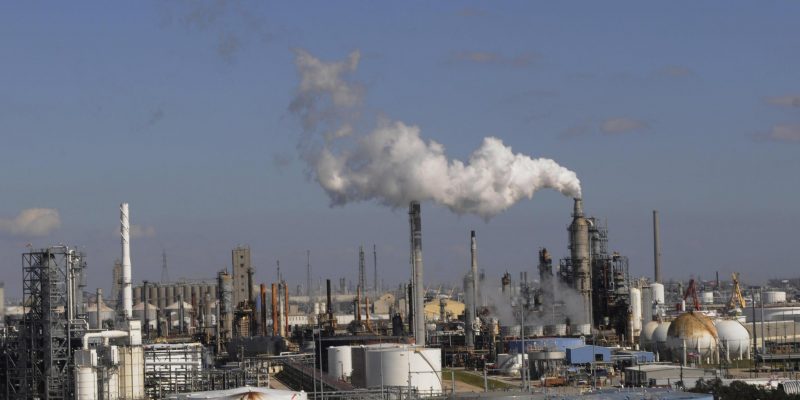Prior to the unprecedented weapons deal President Trump signed with Saudi Arabia, was a little publicized business deal made between the Secretary of State, Rex Tillerson, and his successor at ExxonMobil, Darren Woods, and the Saudi Basic Industries Corporation (Sabic). The $10 billion agreement allows Exxon-Sabic to build the world’s largest plastics facility just north of Corpus Christi Bay on farmland in South Texas and two miles from a middle school, despite protest from local residents.
According to GulfCoastgv.com, the Saudis and ExxonMobil ethane steam “cracker” facility will create thousands of new jobs. The deal includes $1 billion in tax breaks by local authorities– including the school board.
The Huffington Post noted that the White House press statement referred to the deal as a “true American success story,” and included paragraphs verbatim from Exxon’s press release.
But is the deal good for Texas? Or good for Saudi Arabia?
The Guardian notes that the agreement will “create an enormous new glut of bottles, food packaging, polyester clothing and other products that are already, once discarded, choking the world’s oceans and food chains.” It adds:
Opponents of the sprawling plant warn that it will produce trillions of small polyethylene pellets that will inevitably find their way into the bay and surrounding landscape, where they would be gobbled by fish or endangered species such as the whooping crane and piping plover.
The facility will also release millions of gallons of piping hot effluent into the bay, a prospect that has spooked fishers, and suck up 20m gallons of water a day in part of the US that has been parched by drought.
The Guardian commissioned a report by a former Environmental Protection Agency official whose analyzed that roughly 216 million tons of greenhouse gases will be produced every year by the 184 chemical plants anticipated to be built along the Texas– and Louisiana– coastline. He remarked:
Many of these projects are approved so quickly that you are left with highly polluting operations. The Gulf coast is a place already covered in pipelines and storage tanks, but it’s now transforming. The scale is overwhelming. Residents will have to decide how much more of this they are prepared to take.
It is anticipated that the Exxon-Sabic project will produce 1.8 million tonnes of ethylene every year. Ethylene is only one of 11 chemicals being produced by Exxon along the Gulf coast. Frighteningly, the Gulf has been carved up by multi-billion dollar fossil fuel companies to produce chemicals that will increase the global production of plastics by 40 percent. With such production also comes increased pollution, which includes increased health problems for people living along the coast.
Regardless of job creation, the environmental impact could be catastrophic. The Gulf is still reeling from the BP oil spill, which ruined generations of family-owned fishing businesses. Not to mention the loss of wildlife and damage to fragile ecosystems already impacted by unique weather patterns in the Gulf. Or the decimation of Hurricane Harvey to the Corpus Christi area.
Or the fact that residents of San Patricio County (north of Corpus Christi Bay) protested the Exxon-Sabic deal. The proposed plant would be built within two miles of a middle school.
However, county and school district officials don’t care. They voted to offer the tax breaks to the multi-billion dollar companies. According to retired legal aid lawyer, Errol Summerlin, “Exxon bullied their way in here and are tearing the community apart. All our local officials said they wanted it on a different site but Exxon wouldn’t budge.” He added:
We are not naive, we understand who we are up against. If you put Exxon’s money together with the Saudi royal family’s, then lord have mercy, that’s an enormous ring of wealth. But some of us think ‘to heck with this, if you want it you will at least have to fight for it.’ Are we to be completely surrounded by industry here?
Unfortunately, South Texans are in a David v. Goliath situation, with even their local officials against them, who chose financial gain over the health of the residents they are supposed to represent.
Advertisement
Advertisement

